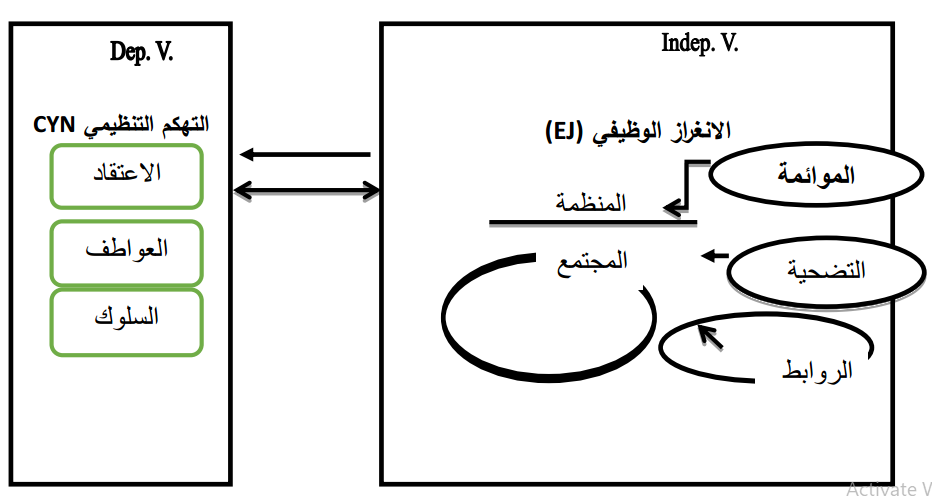The role of job embeddedness in reducing organizational cynicism behavior of workers in health organizations
Keywords:
Job embeddedness, Organizational cynicismAbstract
Testing this research the role for Job Embeddedness represented dimensions three (links, and sacrifice, and Fitting) in the level of organizational cynicism dimensions (belief, emotion, and behavior) in the Department of Health Karbala, data was collected using the tool-resolution sample of staff in the department numbered (106) individual . For the purpose of testing hypotheses and achieve the goals of the research used a set of statistical tools such as coefficient Cronbach alpha and reliability coefficient compound and simple correlation
coefficient and multiple regression analysis stepwise, The results showed a
correlation negative effect between Job Embeddedness and the level of cynicism
organizational, and in the light of these results formulated a set of conclusions
and recommendations aimed at was the most important to reduce organizational
behavior cynicism by strengthening Job Embeddedness.
Keywords: Job Embeddedness, community Embeddedness, organizational
Embeddedness, organizational cynicism
References
- Arabaci, Bakir (The effect of depersonalization and organizational
cynicism levels on the job satisfaction of educational inspectors) African
Journal of Business Management, Vol. 4(13), pp. 2802-2811, (2010).
- Ozler, Derya Ergun; Atalay, CerenGiderler (A Research to Determine
The Relationship Between Organizational Cynicism and Burnout Levels
of Employees in Health Secctor) Business and management Review, Vol.
(4) pp.26-38, 2011.
- Ince, Mehmet; Turan, Suayip(Organizational Cynicism as A Factor that
Affects the Organizational Change in the Process of Globalization and An
Application in Karaman’s Public Institutions) European Journal of
Economics, Finance and Administration Science, Issue (37),2011.
- Brown, Michelle; Cregan, Christina (Organization change Cynicism: The
role of Employee involvement) Human Resource management, Vol. 47,
No. 4, pp. 667-686, 2008.
- Burtton, James; Holtom, Brooks; Sablynski, Chris; Mitchell, Terence;
Lee, Thomas (The buffering effect of job embeddedness on negative
shocks) Journal of Vocational Behavior, 76 (42-51),2010.
- Harris, Kennth; Wheeler, Anthony; Kacmar, Michele (The mediating
role of organizational job emdeddedness in the LMX-Outcomes
relationships) The Leadership Quarterly, Vol.22,(2)(271-281), 2011.11- Zhang, Mian; Fried, David; Griffeth,Rodger (A review of job
embeddedness: conceptual, measurement issue, and directions for future
research) Human resource Management Review, (22), (220-231), 2012.
- Li, Chunyan (The effects of High Performance Work System on Job
Embeddedness) International Conference on Future Informational
Technology and Management Engineering, 2010.
- Mallol, Carlos; Holtom, Brooks (Job Embeddednessin a Culturally
Diverse Environment) J Bus Psychol, (22), 35-40,2007.
- Brandes, P, Dharwadkar, R. & Dean, J. W. (Does Organizational
Cynicism Matter? Employee and Supervisor Perspectives on Work
Outcomes). Eastern Academy of Management Proceedings, 150-153.
Outstanding Empirical Paper Award.(1999).
- Chan, F., Lee, G., Lee, E., Kubota, C., & Allen, Ch., (Structural Equation
Modeling in Rehabilitation Counseling Research), Rehabilitation
Counseling Bulletin, 51:1, 53-66.(2007).
- Dean, J. W., Brandes, P., &Dharwadkar, R. (Organizational cynicism.
Academy of Management Review), 23(2), 341-352(1998).
- Eaton, J. (A Social Motivation Approach To Organizational Cynicism).
Unpublished Dissertation, York University, Toronto, Ontario.(2000).
- Fryxell, G.E. and Wang, J. (The Fortune corporate ‘reputation’ index,
Reputation for what?) Journal of Management, 20(1), 1–14.(1994)
- Johnson, J. L. & O'Leary-Kelly, A. M. (The effects of psychological
contract breach and organizational cynicism: Not all social exchange
violations are created equal). Journal of Organizational Behavior, 24(5),
-647.(2003).
- Kanter, D. L., &Mirvis, P. H. (The cynical Americans: Living and
working in an age of discontent and disillusionment). San Francisco:
Jossey-Bass.(1989).
- Kutanis R. O., & E. Cetinel(Does the perceptions of injustice trigger to
cynicism?) A Case Study. Dumlupinar University, Journal of Social
Sciences, 1: 26, 186-195(2010).
- Proefschrift, A. (Organizational cynicism on the nature, antecedents, and
consequences of employee cynicism toward the employing organization.)
Unpublished Dissertation, University of Maastricht. (2007).
- Holtom, B. C., &Inderrieden, E. J. (Integrating the unfolding model and
job embeddedness model to better understand voluntary turnover).
Journal of Managerial Issues, 18, 435−452.(2006).
- Holtom, B., Mitchell, T., Lee, T., (Increasing human and social capital by
applying job embeddednesstheory). Organizational Dynamics, Vol. 35,
No. 4, pp. 316–331(2006).
- Lee, T. W., Mitchell, T. R., Sablynski, C. J., Burton, J. P., &Holtom, B.
C. (The effects of jobembeddedness on organizational citizenship, job
performance, volitional absences, and voluntary turnover).Academy of
Management Journal, 47, 711–722(2004).
- Mitchell, T. & Lee, T. (The unfolding model of voluntary turnover and
job embeddedness: foundationsfor a comprehensive theory of
attachment). Research in Organizational Behavior, Volume 23, pages 189-
(2001).
- Nunnaly, J.C. & Bernstein, I.H. (Psychometric theory). New York:
McGraw-Hill.(1994).28- Pillay, D. (Mission attachment as a component of organizational job
embededdedness in the trade union sector of South Africa). Unpublished
Dissertation, University of Pretoria.(2009).
- Reitz, O. & Anderson, M. (An overview of job embeddedness). Journal of
Professional Nursing, Vol 27,No. 5: pp 320–327(2011).
- Tanova, C. &Holtom, B. (Using job embeddedness factors to explain
voluntary turnover in four European countries). The International
Journal of Human Resource Management, Vol. 19, No. 9, 1553–
(2008).

Downloads
Published
How to Cite
Issue
Section
License
Copyright (c) 2014 Economics and Administration College - Karbala University

This work is licensed under a Creative Commons Attribution-NonCommercial-NoDerivatives 4.0 International License.
Authors retain the copyright of their papers without restrictions.









